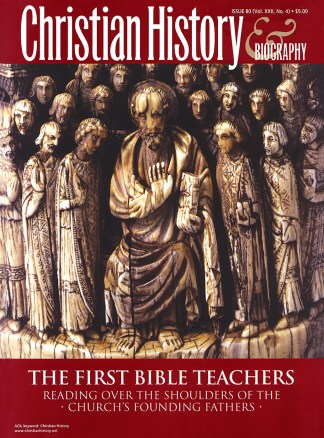There are people who take great pains to twist the sense of the divine scriptures," wrote the fourth-century biblical scholar, Theodore of Mopsuestia, a prominent voice of the exegetical school centered at Antioch, "and make everything written therein serve their own ends. They dream up silly fables in their own heads and give their folly the name of allegory. They misuse the apostle's term as a blank authorization to abolish all meanings of divine scripture."
At the beginning of the third century, Origen of Alexandria introduced to the church an exegetical method that searched for the hidden, spiritual meanings of Old Testament passages, treating the Old Testament as a great allegory of Christ. Most biblical interpreters who followed him worked in this tradition.
But not all. A few Christians recognized the danger posed by the allegorical method. Someone must hold the "spiritualizing" interpreter accountable, or Scripture meanings might be warped into forms the biblical authors never intended.
Home of hermeneutics
As Paul once said of Tarsus, Antioch was "no mean city." We know it as the place where Jesus' followers were first called "Christians," but its secular fame was also well-established. Founded three hundred years before Christ, this city on the Orontes River in modern-day Turkey became the Roman empire's third largest city.
Antioch stood at an east-west crossroads and exerted enormous cultural and political influence throughout the empire. "In what land or sea had the fame of this city not entered?" asked Libanius, chief rhetorician of the Hellenistic school in Antioch. "Attractions of all kinds bring people from all sides [of the empire], from Africa, Europe, Asia, from the islands, from the mainland."
Libanius's school of rhetoric dominated the intellectual environment of Antioch. In Greco-Roman culture, young men wanting higher education trained in schools of rhetoric and philosophy. When rhetoricians read classical literature, they looked for moral principles and ethical models civic authorities could follow, while philosophers, particularly the Stoics, searched for symbolic meanings. Libanius swayed Antiochians (Christians included) toward the rhetorical perspective and away from the metaphysical, even mystical bent of men like Origen.
Lucian of Antioch (d. 312) was the first to offer an alternative to Origen's approach. Emphasizing the need for textual accuracy, he set about revising the Septuagint. Jerome, translating the Hebrew Bible into Latin years later, praised Lucian's work.
Eustathius (c. 270-360), bishop of Antioch, directly criticized Origen in his treatise On the Witch of Endor. For example, Origen had apparently claimed that in 1 Samuel 28, the witch's calling up of Samuel from Hades foreshadowed Christ's resurrection. Eustathius countered that only God can raise people from the dead, and that the devil used the witch to deceive Saul into thinking Samuel spoke to him.
Whether Eustathius was correct is not the point; his concern for the integrity of the text led him to directly confront Origen's premise for finding Christ there.
It was Diodore of Tarsus (d. 390), though, who founded the "school" of Antioch that fully challenged Origen's method. "We demand them [the Alexandrian exegetes] to know that we prefer much more the historical comprehension of the text than the allegorical," he wrote.
Diodore believed Origen's method disparaged Scripture, and he encouraged Christians to retain its literal meaning. Doing so did not rule out theoria, or higher "contemplation" of the biblical passage. But it must be consistent with the author's intentions and the text that surrounded it.
While Origen felt spiritual truth lay beyond the words, like a code to be cracked, Diodore felt meaning lay within the words, pregnant with spiritual significance but still rooted in history.
The "less inspired" Scripture
Diodore's most famous student, Theodore of Mopsuestia (ca. 350-428) carried Diodore's ideas even further. He questioned the canonicity of some of the books in the Bible—especially the apocryphal books in the Septuagint—and preferred the more limited "Jewish" canon. He refused to place the "wisdom" literature on the same level of inspiration as the rest of Scripture. The Song of Songs, he said, was simply a conversation between lovers and nothing more. And he aggressively criticized Paul's epistolary writing style, thereby departing from the traditional understanding of biblical inspiration.
Like Diodore, Theodore was determined to set the biblical text in its historical context. In his commentaries on the psalms and minor prophets—the only works still extant—Theodore wrote an introduction in which he discussed the date, authorship, historical occasion, the purpose of the writer, and a summary of the plan and perspective of the book. In this, his work resembles modern scholarship to a remarkable degree.
The literalists' risky divisions
But Theodore had some radical ideas. Fidelity to the text, he argued, demanded that scholars drastically reduce the number of Old Testament passages that Christians had traditionally held to be messianic prophecies of Christ. In virtually every case, the prophecies of the minor prophets and psalmists referred not to Christ, but to the events of the post-exilic period.
In fact, he limited messianic psalms to just four—Psalms 2, 8, 45, and 110. Even Psalm 22, the psalm Jesus quoted on the cross, was not prophetic of Christ. "Those commentators who claim that this psalm is related to the person of Christ ought to know that they can be accused of recklessness because the second half of the opening saying of the psalm does not allow such an interpretation. How could Christ ever speak of his sins?" By so limiting Christ's presence in the Old Testament, Theodore ran the risk of divorcing it entirely from the New—in a sense creating two Bibles.
Theodore also emphasized to perhaps an unfortunate degree the humanity of Christ in his writings. One of his students, Nestorius, held that Christ had "two natures which are adored in the one person of the only-begotten by a perfect and unconfused conjunction." But Nestorius was later condemned by the Council of Ephesus (431) for dividing Christ's person into two, and Emperor Theodosius II branded him as a heretic.
In 553, more than 100 years after Theodore's death, the Council of Constantinople condemned Theodore's views as heretical and ordered that his commentaries be burned. Only the Nestorian church remembered and preserved his writings. Ironically, orthodox Christians are once again rediscovering the scholar who most effectively challenged the school of Alexandria—and provided another way of understanding the Bible.
Steven Gertz is editorial coordinator of Christian History.
Copyright © 2003 by the author or Christianity Today/Christian History magazine. Click here for reprint information on Christian History.










